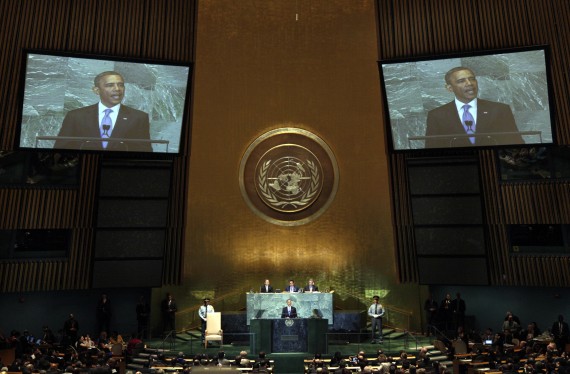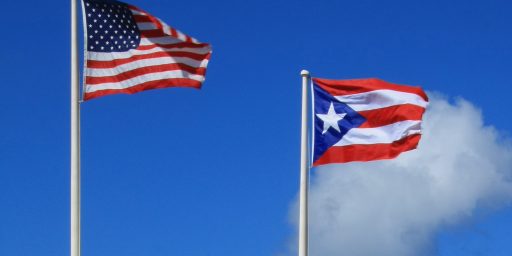At U.N., Obama Says There Are No Shortcuts To Peace
President Obama explained his position on the Palestinian statehood resolution today, but one wonders if anyone listened.
The status of the Palestinian statehood bid is still unknown, but President Obama used his speech to the General Assembly today to explain why the United States would, if necessary, exercise its Security Council veto to block the measures:
UNITED NATIONS — President Obama declared his opposition to the Palestinian Authority’s bid for statehood through the Security Council on Wednesday, throwing the weight of the United States directly in the path of the Arab democracy movement even as he hailed what he called the democratic aspirations that have taken hold throughout the Middle East and North Africa.
“Peace will not come through statements and resolutions at the U.N.,” Mr. Obama said, in an address before world leaders at the General Assembly. “If it were that easy, it would have been accomplished by now.”
Instead, Mr. Obama said, the international community should continue to push Israelis and Palestinians toward talks on the four intractable “final status” issues that have vexed peace negotiations since 1979: the borders of a Palestinian state, security for Israel, the status of Palestinian refugees who left or were forced to leave their homes in Israel, and the fate of Jerusalem, which both sides claim for their capital.
Less than an hour after Mr. Obama spoke, President Nicolas Sarkozy of France stood at the same podium in a sharp repudiation, calling for a General Assembly resolution that would upgrade the Palestinians to “observer status,” as a bridge towards statehood. “Let us cease our endless debates on the parameters,” Mr. Sarkozy said. “Let us begin negotiations and adopt a precise timetable.”
For Mr. Obama, the challenge in crafting the much-anticipated General Assembly address on Wednesday was how to address the incongruities of the administration’s position: the president who committed himself to making peace between the Israelis and the Palestinians a priority from Day One, who still has not been able to even get peace negotiations going after two and a half years; the president who opened the door to Palestinian state membership at the United Nations last year ending up threatening to veto that very membership; the president who was determined to get on the right side of Arab history ending up, in the views of many on the Arab street, on the wrong side of it on the Palestinian issue.
The Arab Spring quandary, in particular, has been enormously troublesome for Mr. Obama. White House officials say that he has long been keenly aware that he, like no other American president, stood as a potential beacon to the Arab street as the ultimate symbol of the hopes and rewards of democracy. But since he is the president of the United States, he has had to put American interests first.
So Mr. Obama’s entire 47-minute address appeared, at times, an effort to thread the needle meant to balance his efforts in support of democratic movements against his efforts to stand behind Israel, America’s foremost ally. From the moment he stepped behind the podium and began talking, everything he said seemed directed to one point. “Mr. President, Mr. Secretary-General, fellow delegates, ladies and gentlemen: It is a great honor for me to be here today. I would like to talk to you about a subject that is at the heart of the United Nations—the pursuit of peace in an imperfect world.”
Mr. Obama called this year “a time of transformation.” This year alone, he said, “more individuals are claiming their universal right to live in freedom and dignity.”
He hailed the democratic movements in the Ivory Coast, in Tunisia, in South Sudan. Of Egypt, where President Hosni Mubarak fell after 30 years, Mr. Obama said, “we saw in those protesters the moral force of non-violence that has lit the world from Delhi to Warsaw; from Selma to South Arica—and we knew that change had come to Egypt and to the Arab world.”
He hailed the Libyan toppling of Col. Muammar el-Qaddafi, and threw his weight behind the protesters in Syria.
But, he said, Palestinians must make peace with Israel before gaining statehood themselves. Both Israelis and Palestinians, he said, have legitimate grievances that should be addressed. “The deadlock will only be broken when each side learns to stand in each other’s shoes,” Mr. Obama said. And he issued an oblique challenge to the United Nations itself as an institution which has long been accused of being anti-Israel.
“This body, founded, as it was, out of the ashes of war and genocide; dedicated, as it is, to the dignity of every person, must recognize the reality that is lived by both the Palestinians and the Israelis,” Mr. Obama said. “We will only succeed in that effort if we can encourage the parties to sit down together, to listen to each other, and to understand each other’s hopes and fears. That is the project to which America is committed, and that is what the United Nations should be focused on in the weeks and months to come.”
Several times as Mr. Obama spoke, the Palestinian Authority president, Mahmoud Abbas, seated in the room, put his forehead in one hand. But Prime Minister Benjamin Netanyahu of Israel, whose relationship with Mr. Obama has often been tense, expressed appreciation after the speech, calling it a “badge of honor” when both leaders met later in the day.
According to some reports this morning, the Palestinians are only two votes short of the majority that would require the United States to exercise its veto, and it’s fairly clear that the President would prefer not to have to do that. If that happens, then whatever good will the Untied States has left in the Middle East will likely be shot and the Islamists and Iranians will be handed a propaganda victory that they will no doubt exploit to distract the masses in their countries from the social problems that have led to nearly a year of protests and revolution. The reaction in the territories is likely to be negative as well, and that could lead another round of conflict with Israel that will set the peace process back even further. Thus, it appears that the current strategy in New York is to get the Palestinians to withdraw the request or accept something lesser, such as an enhanced Observer Status in the General Assembly.
At this point, though, one wonders if a delay or compromise will just make the situation worse. The U.S. has taken a public role in trying to block the Palestinian resolution and that became even more public with the President’s speech today. The fact that the U.S. position happens to be correct here is irrelevant, because its the propaganda that it will create in the Arab world that will be the cause of problems in the future. On the Palestinian side, Abbas has led his people down the primrose path with a statehood resolution that really isn’t going to create a state, and will do nothing to solve the massively complex border issues that need to be negotiated with Israel. If he returns home with something less, one wonders if that will cause him to lose credibility at the expense of those who prefer a more radical and violent approach. Whatever one thinks about the Israeli/Palestinian issue, this statehood resolution is a foolish and dangerous move.







I know these are not your words, but I do not understand why the NY Times wrote:
“Less than an hour after Mr. Obama spoke, President Nicolas Sarkozy of France stood at the same podium in a sharp repudiation, calling for a General Assembly resolution that would upgrade the Palestinians to “observer status,” as a bridge towards statehood. “Let us cease our endless debates on the parameters,” Mr. Sarkozy said. “Let us begin negotiations and adopt a precise timetable.””
To the contrary, this seems to be very similar to Obama’s position, not a repudiation of it.
@Moosebreath:
Not having seen all of Sarkozy’s speech I don’t know for sure. But I agree, it’s odd
It’s my understanding that if the general assembly votes to give the Palestinians the status of observer state, the U.S. can’t use its veto to stop it.
Few Americans read foreign newspapers, but the animus in Europe, Asia and Latin America toward Israel is big. Anytime that the Israelis shoots a flotilla the Islamists are handed a propaganda victory. Not only that: people in the Developing World sees Israel as a Opressive Colonial Power.
@Andre Kenji:
I know that’s the way Israel is seen. Indeed, I think that many Europeans see Israel in much the same way as well. IMO that shows just how appealing the Soviet framing of events was rather than anything material about Israel, its status, and that of the Palestinians.
The problem with statehood for the Palestinian Territories imposed by the UN is the same as with many foreign policy solutions imposed from above: what then?
Without a commitment to accept the existence of Israel as a Jewish state, it’s hard to imagine that the attacks from across the border, so galvanizing for Israelis, won’t continue. However, they”ll continue in a Westphalian framework in which the Palestinian government is responsible for attacks that are mounted from within their borders.
@Dave Schuler:
I agree. When last the UN did this in 1947, it turned into an utter travesty.
(it is the irony I can not help point out)
Hmm…what about the fact that Israel continues to gobble up land in the West Bank? Surely this plays a part in how Israel is viewed and that isn’t simply about “Soviet framing”…
@OzarkHillbilly:
Of course the 1947 UN Partion included a Jewish State called Israel and a Palestinian state. The Arab world refused to accept that and launched a war against Israel the day it was born. When that war was over eight months later, the Israelis ended up controlling more territory than they would’ve gotten in the original partition, and the Jordanians and Egyptians were left with a population of refugees that they really didn’t care about.
History matters here.
Few of the Palestinians living in the ghettoized, occupied West Bank were alive in 1947, Doug.
I’d guess less than 1%.
History doesn’t matter that much.
@ponce:
If the Palestinian people understood the difference between history and the propaganda the Arab world and their leaders have fed them for 64 years, they’d realize just how much they’ve been had.
The Palestinians understand that they currently have to pass through abusive Israeli military checkpoints to visit relatives who live down the street from them or just to go shopping.
@Doug Mataconis:
Don’t forget the support of the US in the 1947 war.
The Israelis were using WW2 weapons given to them by the US and led by US officers trained in modern warfare.
vs.
Arabs using WW1 weaponry with tactics straight out of Lawrence of Arabia.
.
Just wanted to do my bit to explain the Israeli super soldier myth. History matters
@ponce:
I’ve heard that, too. OTOH, I’ve also heard that any Israeli wearing a yarmulke who enters into Palestinian-administered territories alone is quite likely to return home in coffin.
Almost all those Yarmulke wearing Jews carry automatic weapons.
Despite the number of people here (and in the companion thread) advocating for a war they won’t fight or die in, I think Obama is being the statesman here, taking an unpopular stance amongst people with the power of five-to-seven word slogans.
But enough about the neocons and Iraq…
@Doug Mataconis
It’s a huge symbolic victory at the very least, which is what Abbas needs. His credibility is otherwise shot to hell, and he’s got nothing to show for years’ worth of negotiations. Unless the US can give him something worthwhile, all he’s being promised is another round of negotiations, which will probably end up just like the prior round of negotiations. And the round before that. And the round before that. And the round before that.
It does, which is why your simplistic understanding of what happened then is not useful. The Palestinians and surrounding Arab countries were right to oppose the Partition Plan – it was forced on to them by the UN, after two decades of top-down British rule. It gave the bare majority of the land to the Israelis, even though they represented a minority concentrated in a handful of areas (several areas given to Israel were overwhelmingly Arab, such as parts of the Negev).
Sure, they lost the war, but they were right to oppose Partition in the first place.
“Without a commitment to accept the existence of Israel as a Jewish state, it’s hard to imagine that the attacks from across the border, so galvanizing for Israelis, won’t continue”
That´s part of the problem. At it´s best a Jewish State is democractly fragile, at it´s worst it´s a Apartheid/Jim Crow state(It´s the same thing as a Muslim or a Catholic State). If Israel want´s to exist it has to integrate it self not only with the Palestine population but with the Arab population as a whole. No country can survive being eternally at war with it´s neighbors. And they can´t wait for the goodwill of the Arabs to have that, but they have to take decisive action toward that.
israel can´t wait the Americans to help to protect them all the time. Today we have a Palestinian population that only survives because they get monetary help from the Europeans, while Israel to exist as a state requires billions of subsidies from the American Taxpayer(That´s specially tough in world where the United States is going to have less influence).
It would be laughable if it weren´t tragic. Besides that, the fact that so many people are attacking Israel in blog like OTB is telling. The Israelis that created this whole situation.
@Doug Mataconis: Doug, all of that is so beside the point I was making. I am well aware of the history. Especially the part about the UN creating the country of Israel. That you are unable to appreciate the irony and gloss over it with what happened after is truly impressive.